Granting Visa To Iranian FM Sparks Strong Criticism In The US

The decision to grant a visa to the Iranian foreign minister to attend the emergency meeting of the UNGA has ignited fierce criticism in the United States.

The decision to grant a visa to the Iranian foreign minister to attend the emergency meeting of the UNGA has ignited fierce criticism in the United States.
Joni Ernst, a Republican Senator, took to X to express her concern, stating, "While Iran-backed terrorists have attacked our servicemembers and are currently holding Americans hostage, the Biden administration has granted a top Iranian official a visa — welcoming this regime on US soil with open arms. The appeasement must end."
FM Hossein Amir-Abdollahian is visiting New York to take part in the emergency meeting of the United Nations General Assembly, scheduled for Thursday, to discuss the Israel-Palestine conflict. He is set to speak following representatives from Palestine, Israel, and Jordan.
Jason Brodsky, the Policy Director at United Against Nuclear Iran, raised serious reservations about the visa issuance, pointing out that the Iranian foreign minister had participated in planning meetings for the recent Hamas attack on Israel. Brodsky also noted that there is an exception in the US UN Host Agreement that allows for the denial of entry to foreign officials for UN meetings in cases of security, terrorism, and foreign policy concerns. He argued that this exception should have been invoked in Amir-Abdollahian’s case.
Former State Department advisor on Iran, Gabriel Noronha, also criticized the visa decision. He questioned the rationale behind granting a visa to the foreign minister of a country that has been accused of funding Hamas, which has targeted and killed Americans. Noronha highlighted that the US has the legal right to block the entry of such individuals, citing precedents like the denial of entry to Yasser Arafat and Javad Zarif in the past.
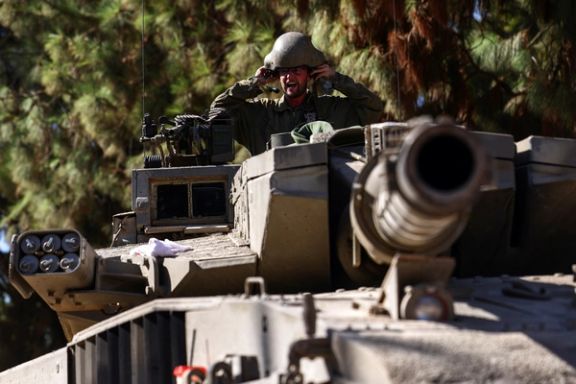
A prominent reformist figure in Iran says supporting Russia in Ukraine was a strategic mistake and support for Hamas could lead to yet another strategic blunder.
Mohsen Mirdamadi, the vice speaker of the Iranian parliament under the reformist government of Mohammad Khatami in the late 1990s and early 2000s, suggested in an interview with Etemad newspaper in Tehranthat that the government should avoid any intervention in Israel's war in Gaza. Mirdamadi reiterated that Iran's involvement in the war is not likely to end well for Tehran.
While criticizing the government for its over-reliance on Russia instead of seeking to lift US sanctions and engage in negotiations to revive the JCPOA nuclear deal with world powers, Mirdamadi was the first influential reformist to announce a critical stance regarding the Gaza war.
Speaking about the development with Iran International television on Wednesday, commentator Mohammad Rahbar said that in Mirdamadi's statement, the "government" is in fact an alias to refer to Supreme Leader Ali Khamenei.
Incidentally, the interview was published,and the press review was aired on the same day that Khamenei once again praised the militant group Hamas for its terror attack on Israel and said that Palestinians will ultimately win the war.
Mirdamadi also argued that as the war in Gaza continues, any development other than elimination of Hamas will be tantamount to a defeat for Israel. Agreeing with the essence of what the regime says about Hamas having inflicted a heavy blow on October 7, he portrayed Israel as significantly weakened.
He said that unlike the first days of the war, the world's public opinion and media have now turned in favor of the Palestinians and Israel has been the loser and if the current trend continues it is going to be the final loser of the war.
Mirdamadi reiterated, "While Israel has repeatedly declared that its final objective is the total elimination of Hamas, any result other than that will be a defeat for Israel." He added: "If Israel is not the winner of the war, one of the consequences of this for Israel will be the decline of its status."
In the unlikely event that Israel defeats Hamas, he argued, Israel’s enemies in the region will be weakened. “In this case, Israel will go the extra mile eliminating Hamas and Palestinians and will begin to eliminate other regional forces such as the Lebanese Hezbollah," Mirdamadi said, adding that "However, doing so will spread the war and will entangle the region in a continuous conflict."
Mirdamadi, one of the most influential reformist figures after former President Mohammad Khatami, who was once the leader of Iran's most powerful reformist party Mosharekat [Particiation], made sure to say in the interview that Khamenei also believes not to directly get involved in the Iarael Hamas war.
He said Khamenei is aware of the dangers of getting involved in a direct confrontation [with Israel and the United States] and advised other Iranian politicians to avoid any statement that might heighten the risk for Iran's intervention in the war. However, he pointed out that some Iranian officials took inappropriate positions contrary to what Khamenei thinks.
He insisted that so far, Israel has been humiliated and no matter what the end result of the war might be, the idea of establishing an independent Palestinian state will be strongly supported once the conflict ends. Mirdamadi opined that Western countries will inevitably support the idea of an independent Palestinian state in order to prevent further crises.
Iranian commentator Morteza Kazemian told Iran International news on Wednesday that Khamenei's new position on the war in Gaza is likely to have been inspired by his isolation and by part of UN Chief Antonio Guterres and the United Arab Emirates' UN envoy's speech at the UN in which they criticized Western governments for their one-sided support of Israel, although he also continued his usual bragging against Europe, the United States and Israel. Kazemian also accused Khamenei of having no concern about the lives of children and other civilians in Gaza.
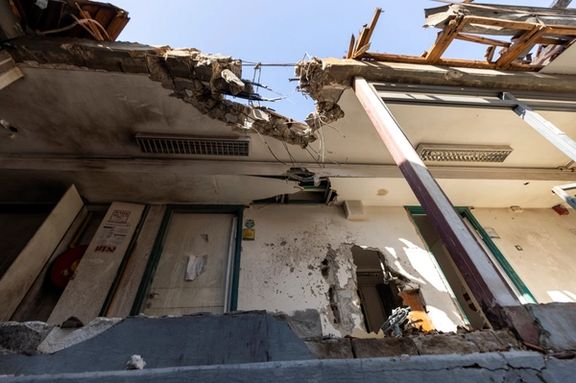
Iran has trained hundreds of Islamist fighters for combat in the weeks leading up to the attack on Israel, the Wall Street Journal cited intelligence sources as saying.
The WSJ said Wednesday that about 500 members of the militant groups Hamas as well as Palestinian Islamic Jihad received specialized combat training in Iran in September, the people familiar with intelligence related to the assault.
The training was led by officers of the Quds Force, the Revolutionary Guards’ extraterritorial wing, while senior Palestinian officials and Quds Force Commander Brig. Gen. Esmail Qaani also attended the training.
More than 1,400 people, mostly civilians, were killed October 7 by Hamas fighters who poured across the border from the Gaza Strip. Scores of others were kidnapped and taken back to Gaza, where they are being held hostage. Nearly 6,000 Palestinian have died in Israel's retaliatory air campaign.
Iran is not shy about its financial and logistical support for its proxy militias across the region, including Hamas. US officials said Iran has regularly trained militants in Iran and elsewhere, but Washington said it had found no indications of a mass training specifically to prepare for the attack.
“Before the war, Iran directly assisted Hamas with money, training and weapons and technological know-how,” said Rear Adm. Daniel Hagari, the military’s chief spokesman, on Wednesday. “Even now, Iran is helping Hamas with intelligence.”
Earlier in the month, the Journal cited senior Hamas and Hezbollah officials as saying that the Quds Force helped plan the attack and agreed that it could go ahead at a meeting in Beirut on October 2 with leaders of Hamas and Hezbollah. An adviser to the Syrian government and a European official gave the same account of Iran’s involvement.
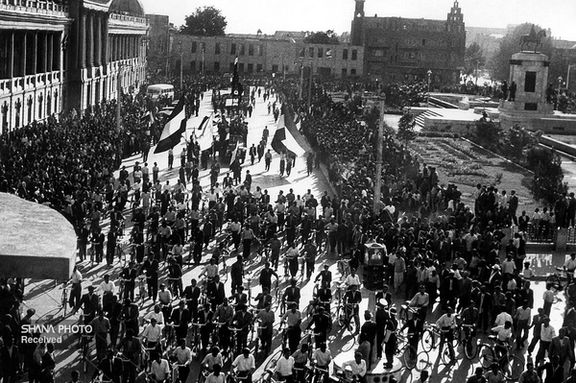
The Iranian regime is planning to hand over the oil industry to the “private sector,” which will effectively place the national wealth in the hands of insiders.
In 1951, the Iranian parliament seized control of the country’s oil industry which had been run by private companies, largely controlled by the British. The movement that led to the legislation was led by Mohammad Mosaddegh, a populist lawmaker who became Iran’s prime minister a year later. The legislation led to the nationalization of the Anglo-Iranian Oil Company, a British firm founded in 1909 following the discovery of a large oil field in Khuzestan province and the first to extract petroleum in Iran.
According to an article in reformist daily HamMihan on Tuesday titled “Transitioning Beyond Oil Nationalization” the government, in its Seventh Development Plan, seeks to hand over the rights for exploration, development, extraction, production, and exports of oil and gas to the private sector. It practically means that the government no longer regards oil and gas reserves as the assets of the nation but views it as its own property, and has decided to transfer the rights to the National Development Fund (NDF) that later can sell rights or ownership to domestic entities.
More than 80 percent of Iran's economy is controlled by the clerical regime, including the Revolutionary Guard, leaving little room for real businessmen or private companies to flourish.
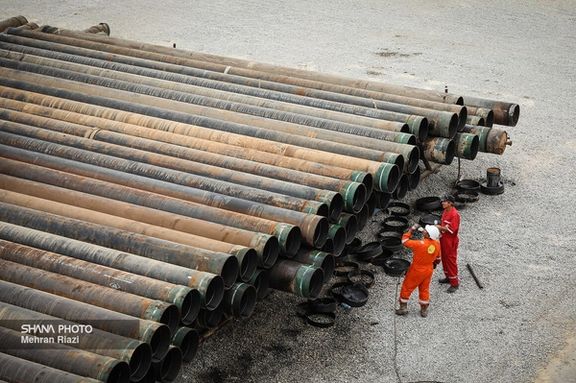
The administration of President Ebrahim Raisi submitted the country’s Seventh Development Plan to the parliament last month. After lawmakers refused to approve Raisi’s initial plan apparently for being too general and vague, the administration practically extended its expired development plan for the third time since 2021 with a few amendments and called it a new plan. The old document, the 6th Development Plan, was to be implemented between 2016 and 2021, but many parts of it have remained untouched as the government lacked the appropriate resources due to a catalogue of foreign policy and economic problems. If approved by the parliament, two provisions of the new plan authorize the government to facilitate the delegation of contracts in the oil industry.
According to the amendments, it is stipulated that "the government is allowed to sign contracts (with third parties) on exploration, development, extraction, production, sale, and export at oil and gas fields via the Oil Ministry to settle its debts to the NFD, without transferring their sovereignty.”
Warning of the consequences of such a move, HamMihan said the main concerns are not limited to the act of transferring the national rights to the private sector, but the fact that the country’s oil and gas industry will end up at the hands of quasi-state organizations and institutions controlled by regime insiders. Based on the experience from similar measures, the entities that truly represent the private sector lack the capability and resources needed to handle such big projects, the daily said. It argues that semi-governmental or semi-public firms (called Khosoulati in Persian) will be the ones that would eventually take control over the fields. Khosulati is portmanteau word made from fusing two Persian adjectives for “private” and “governmental” and refers to companies that are sold to the private sector on the surface, but are owned by the government, IRGC-linked entities, regime’s bigwigs or entities under the control of the Supreme Leader.
The sanctions imposed on Tehran and the country’s murky regulations and shady oil exports make it extremely difficult – if not impossible – to attract foreign investors, who would fear US reprisal and punitive measures in case of entering the country’s oil and gas market.
Pundit Mohammad Mashinchian told Iran International that Iran’s oil and gas industry is in dire need of infrastructural investment and the NDF was meant to achieve that but failed like many other good ideas in the Islamic Republic. He described the latest decision as a “coup de grâce to the initial idea” of the fund. Highlighting Iran’s corrupted oil economy, he said the sanctions serve as a pretext to giving control of the country’s exports to the authorities’ close circles. “This is laundering Iran’s national wealth into the hands of the regime’s circles of power,” he noted.
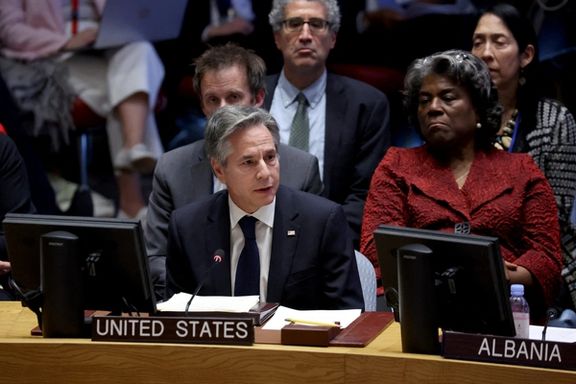
Washington has communicated a potential shift in its stance regarding Iranian assets held in Qatari banks and postponed talks on nuclear issues.
The message was allegedly delivered by Secretary of State Antony Blinken during his visit to Doha on October 13, according to Amwaj Media.
The delay is suspected to be driven by the tensions surrounding the war waged by Iran-backed terror group Hamas on October 7 against Israel when thousands of its militia slaughtered at least 1,400 civilians and soldiers and took at least 220 more hostage.
Since then, attacks have taken place on US bases in Iraq and Syria, with Iran's Yemen proxy, the Houthis, also sending missiles towards Israel since the war broke out, intercepted by the US and Saudi Arabia.
According to Amwaj Media, a source denied the war in Gaza was to blame for the postponement.
In August, Tehran and Washington struck a deal that led to the liberation of five American hostages held in Iran, in exchange for the release of $6 billion in frozen Iranian assets located in South Korea. These Iranian assets were first transferred to Switzerland's central bank for conversion before being subsequently moved to Iranian bank accounts based in Qatar.
The United States has made itself clear in its desire for Iran to stay out of the Israel-Hamas conflict and warned it to control its Lebanon proxy, Hezbollah. It has also pledged its commitment to support Israel as it vows to rid the Gaza Strip of the terror group designated by the US, EU and UK.
As of the time of this publication, the US State Department has not issued an official statement regarding the developments.

Amir-Arsalan Ejdehakosh, a 15-year-old protester arrested last year, hanged himself on the anniversary of his detention, Iran International has learned.
Ejdehakosh was detained for two months during the protests which followed the death in morality police custody of Mahsa Amini and committed suicide on October 7.
During his two months in detention, he endured both physical and psychological torture. His ordeal included sleep deprivation and recurring nightmares after his release as a result of the torment he suffered while in custody.
Amir-Arsalan was not only a young protester but also a passionate fan of rap music. Before his arrest, he had been working on an experimental piece of music, a project he was unable to complete due to his incarceration.
Since the initial wave of protests following Mahsa Amini's death, nearly 20,000 Iranians were arrested by regime agents during or between protest rounds. While many were released, a few have met mysterious and untimely deaths.
Among them, in November, was the case of Arshia Emamgholizadeh, a 16-year-old who was arrested in East Azarbaijan province for tossing the turban of a cleric. He spent ten days in detention before being released on bail, but two days later, he tragically took his own life. Arshia had confided in friends about the use of unknown pills administered by prison authorities.
Some medical experts have raised concerns that the administration of drugs to certain prisoners may have inadvertently resulted in addiction, which exacerbated their mental health issues upon release.